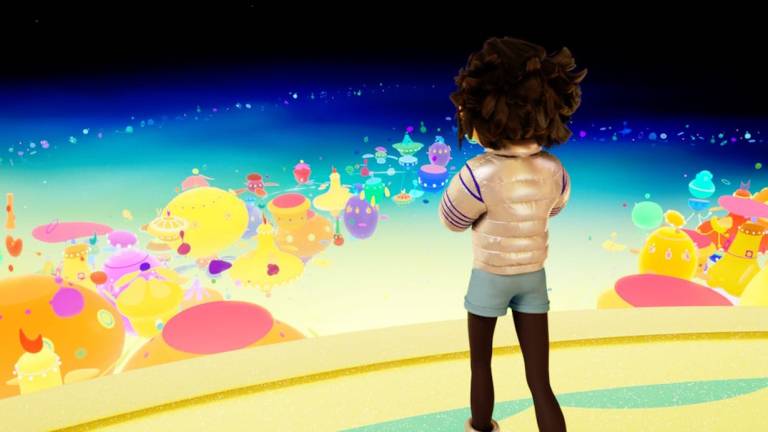Over the Moon Review: Lunar Lessons in Grief
Glen Keane’s animated musical shoots for the moon and succeeds in a pitch-perfect examination of loss.

Animated movies for children walk a tricky tightrope between imparting sobering life lessons about coping with loss and confronting societal evils, without also extinguishing all of the magic that guides a child through the world. It’s rare to find a kids’ movie that doesn’t involve the loss of at least one parent, yet this trope is usually more backstory than anything else—a distant event that establishes the emotional stakes but isn’t actively engaged with. Not so in Over the Moon, Pearl Studio’s poignant musical about a Chinese girl who builds a rocket to seek out the Goddess of the Moon. The film, written by the late Audrey Wells (Under the Tuscan Sun, The Hate U Give) and directed by Glen Keane (The Little Mermaid, Beauty and the Beast), gives the stages of grief as much weight and care as the phases of the moon.
For young Fei Fei (Cathy Ang), there is no question about the different magics that stitch her world together: it’s in the mooncakes that her Mother (Ruthie Ann Miles) and Father (John Cho) lovingly bake for the Mid-Autumn Festival, and in her parents’ stories about the tragic love between Moon Goddess Chang’e and human archer Houyi. When a magic potion conferred immortality upon Chang’e, but tore her away from the mortal Houyi, the goddess chose to live on the moon. Even if she could not be with her beloved on Earth, she would still be as close as possible, looking down on him. The myth takes on special significance for Fei Fei, as Mother quickly becomes ill and passes away, all in the span of the movie’s second song.
Four years later, the grief is no less sharp for preteen Fei Fei, who projects onto her widower father the role of Houyi. But when the Mid-Autumn Festival comes around and Father looks to be moving on with a new family in the kind Mrs. Zhong (Sandra Oh) and her hyperactive son Chin (Robert G. Chiu), Fei Fei fears that he has forgotten her mother altogether. Fueled by anger and an unwavering belief in the existence of the lunar goddess a mere 238,900 miles away, Fei Fei bargains with her sorrow by building a rocket and launching it at the moon. If only she can prove that Chang’e exists, then Father won’t stop hoping to be reunited with Mother someday.
But the movie really sparkles with its creativity when she gets there, and Chang’e (Hamilton’s Phillipa Soo) isn’t the ethereal, serene figure of Mother’s stories. Upon her DIY moon landing, Fei Fei discovers that the goddess long ago dropped that mantle in order to become an “extraordinary, ultra-luminary” popstar: lunarpunk by way of Lady Gaga-inspired costumes and K-pop-inspired earworm beats. Centuries of rattling around a neon prison of her own making—literally, created by her tears—has transformed Chang’e into a vain, self-obsessed performer who wants only the validation of her peons’ applause. This Chang’e resembles more a cruel queen than the maternal figure Fei Fei needs
Sony Pictures Imageworks (the company behind Spider-Man: Into the Spider-Verse) deftly balances the magical with the scientific, the complex with the simple, in animating this movie that can best be described as a space fantasy. On Earth it’s refined by the incredible details, down to the design on the mooncakes, and the photorealistic fireworks acting as rocket boosters. A single spectacular sequence combines crimson-and-golden lion guardians, like something out of an old painting, with the desolate, craggy surface of the moon. Then there’s Chang’e’s entire neon aesthetic, bright and pulsing with life, as if it were something out of The Lego Movie.
Meanwhile the soundtrack is best appreciated not for individual numbers—no single song attains Disney classic status—but rather as the sum of its parts. There is a clear emotional arc to these varied numbers that when experienced as a whole is remarkable. The movie’s first few tracks draw their inspiration from traditional Chinese music, with later numbers layering on the K-pop influence, and then ultimately stripping the songs back down to their purest essence, matching Chang’e’s various phases.
That said, the songs do peak via the goddess’ popstar persona, with the most memorable numbers including her epic introductory performance of “Ultraluminary” and “Hey Boy,” a fun ping-pong/rap battle between Chang’e and Chin. While the team of Christopher Curtis, Marjorie Duffield, and Helen Park worked together on all of the songs, no doubt it was Park’s influence that made these particular numbers soar. (She was behind the 2017 Off-Broadway musical KPOP, in which Ang starred.) Composer Steven Price’s alternately playful and stirring score ties it all together wonderfully.
These sequences are so spectacular that it leaves something to be desired by a late in the movie scavenger hunt where Fei Fei begins pursuing a “gift” to save her family. Unfortunately, it is no more than a lunar MacGuffin: a distraction from the grief that weighs down both Fei Fei and Chang’e herself.
Nevertheless, Over the Moon never loses sight of the fact that this is not a story about gaining something or someone, but rather about learning how to cope with an unimaginable absence. Tragically, Audrey Wells died in 2018 following a long battle with cancer. A prolific screenwriter with a talent for writing across genres (rom-com The Truth About Cats & Dogs, Disney’s The Kid and the live-action George of the Jungle), Wells left behind a tremendous gift in this script. This is a heartfelt, empathetic lesson in moving on, written by someone who must have been considering exactly that ordeal from the other side. (It should be noted that Jennifer Yee McDevitt and Alice Wu contributed additional material to the screenplay.)
Parents may wind up ugly-sobbing while their children dance along to Chang’e’s pop numbers, but hopefully the film will provide the opportunity to talk candidly about embracing grief and memorializing those lost while looking to the future—magic for all viewers, regardless of age.
Over the Moon is available Oct. 23 on Netflix.
